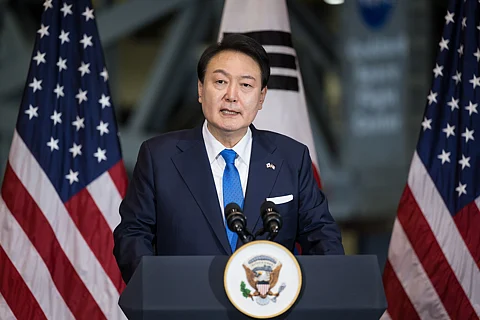

South Korean President Yoon Suk Yeol, who was impeached by lawmakers following his controversial declaration of martial law, has been released from detention after prosecutors opted not to appeal a court decision to cancel his arrest. However, Yoon remains suspended from his official duties and continues to face both criminal charges and an impeachment trial.
Yoon was seen bowing to cheering supporters, many waving South Korean and U.S. flags, as he exited the detention center in Uiwang on Saturday. In a statement following his release, he expressed gratitude to his supporters and future generations, saying, “I would also like to express my deep gratitude to the many citizens who have supported me despite the cold weather, as well as to our future generations.”
Yoon’s legal team hailed the court’s decision as a victory for the rule of law, stating that it “confirmed that the president’s detainment was problematic in both procedural and substantive aspects.” They described the ruling as the “beginning of a journey to restore rule of law.” Yoon himself thanked the court for what he called “their courage and determination in correcting the illegality.”
The Seoul Central District Court accepted Yoon’s request to cancel his arrest warrant last month, citing concerns over the legality of the investigations against him. Yoon was initially arrested in January on charges of insurrection related to his December 3 martial law decree, which plunged the country into chaos. The decree banned political activity and deployed troops to the heart of Seoul, but it was reversed within six hours after lawmakers forced their way into parliament and unanimously voted to block it.
Lawmakers subsequently voted to impeach Yoon, and the country’s Constitutional Court is now deliberating whether to permanently remove him from office or reinstate him. Prosecutors allege that Yoon’s brief imposition of martial law amounted to rebellion, a charge that carries the possibility of the death penalty or life imprisonment if convicted.
On Friday, South Korean prosecutors confirmed they would not appeal Yoon’s release. In a statement reported by local media outlet Yonhap, the prosecution said, “The Emergency Martial Law Special Investigation Headquarters has sent a release order for President Yoon to Seoul Detention Center today.”
Yoon’s release allows him to await the impeachment verdict, expected in the coming weeks, from home rather than in detention. However, his legal troubles are far from over. The impeachment trial is separate from the criminal charges he faces, and the Constitutional Court is expected to rule on his presidency in the coming days.
The court’s decision has sparked mixed reactions. Lee Jae-myung, leader of South Korea’s main opposition Democratic Party, criticized the ruling, stating that it does not absolve Yoon of allegations that he “destroyed the constitutional order through an unconstitutional military coup.” The Democratic Party also condemned the prosecutors’ decision, calling it a move that “throws the country and people into crisis” and urging the Constitutional Court to remove Yoon from office as soon as possible.
Public opinion remains deeply divided. A Gallup Korea poll released on Friday showed that 60% of respondents support Yoon’s removal from office. Over the weekend, tens of thousands of protesters took to the streets of Seoul, with approximately 55,000 Yoon supporters rallying in the city’s main districts and 32,500 demonstrators gathering near the Constitutional Court to protest against him, according to Yonhap.
As the nation awaits the Constitutional Court’s decision, Yoon’s political future hangs in the balance, with the outcome likely to have significant implications for South Korea’s democratic institutions and political stability.